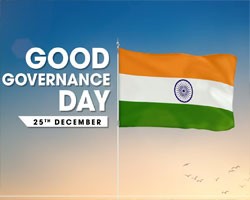SSC Current Affairs
| Important Days |
|---|
|
|
|
Good Governance Day is observed annually on December 25 in India to commemorate the birth anniversary of Atal Bihari Vajpayee, a former Prime Minister of India and Bharat Ratna awardee. The day highlights the importance of transparency, accountability, and responsiveness in the administration to ensure effective governance. The observance of Good Governance Day on December 25, 2024, also marks the 100th birth anniversary of former Prime Minister Atal Bihari Vajpayee, whose leadership exemplified the principles of good governance, focusing on accountability, transparency, and inclusive growth.
Key Objectives of Good Governance Day: Promote Awareness: To raise awareness among citizens about the government's commitment to providing efficient, transparent, and accountable administration. Encourage Citizen Participation: To emphasize the active involvement of citizens in the decision-making process and governance. Foster Development: To highlight the role of good governance in achieving sustainable development and growth. Tribute to Leadership: To honor Atal Bihari Vajpayee's vision of governance centered on inclusiveness, innovation, and people-centric policies. What is the theme for Good Governance Day 2024: The theme for 2024 is “India’s Path to a Viksit Bharat: Empowering Citizens through Good Governance and Digitalisation.” This theme underscores the transformative potential of digitalisation in empowering citizens and enhancing the effectiveness of governance. Significance of Atal Bihari Vajpayee's Legacy: Known for his statesmanship, Vajpayee is remembered for introducing policies that strengthened India's economic and infrastructural foundations, such as the Golden Quadrilateral Highway Project and Sarva Shiksha Abhiyan (Education for All). His leadership style was rooted in consensus-building, democratic values, and visionary reforms, making him a symbol of good governance. About Atal Bihari Vajpayee: Atal Bihari Vajpayee (1924–2018) was a revered Indian statesman, poet, orator, and a visionary leader. He served as the Prime Minister of India three times: for a brief term in 1996, for 13 months from 1998 to 1999, and then from 1999 to 2004. Known for his moderate and inclusive political approach, Vajpayee is remembered as one of India's most influential leaders. Early Life: Born: December 25, 1924, in Gwalior, Madhya Pradesh, India. He developed an early interest in literature and politics, earning degrees in Hindi, English, and Political Science. He joined the Rashtriya Swayamsevak Sangh (RSS) in his youth and was deeply influenced by its ideology. Political Career: Founding Member of BJP: Vajpayee was instrumental in establishing the Bharatiya Janata Party (BJP) in 1980, advocating a blend of cultural nationalism and democratic governance. Parliamentarian: He was elected to the Lok Sabha (House of the People) ten times and twice to the Rajya Sabha (Council of States), representing various constituencies over his long political career. Prime Minister: First Term (1996): His government lasted just 13 days due to a lack of majority. Second Term (1998–1999): Oversaw India's nuclear tests at Pokhran-II, demonstrating India's nuclear capability and strategic autonomy. Third Term (1999–2004): Focused on economic reforms, infrastructure development, and peace initiatives with neighboring countries. Major Achievements: Economic Reforms: Liberalized the Indian economy and encouraged foreign investment. Initiated policies to modernize India's infrastructure, including the Golden Quadrilateral Project connecting major cities with highways. Nuclear Policy: Conducted the Pokhran-II nuclear tests in 1998, asserting India's strategic strength while advocating for global peace and disarmament. Peace Efforts: Made bold diplomatic moves, including the Lahore Bus Diplomacy, to improve India-Pakistan relations. Despite the Kargil War (1999), he sought peaceful resolutions to conflicts. Sarva Shiksha Abhiyan: Launched a nationwide initiative to universalize elementary education and improve literacy rates. Kisan Credit Card Scheme: Introduced measures to improve the financial security of farmers. Personal Traits and Legacy: Vajpayee was known for his oratory skills, often blending wisdom, wit, and poetry in his speeches. His writings, particularly his Hindi poetry, reflect his philosophical and humanitarian outlook. He emphasized consensus-building in politics, often reaching out to opposition parties to ensure smooth governance. Awards and Recognition: Bharat Ratna (2015): India’s highest civilian award, recognizing his immense contribution to the nation. Padma Vibhushan (1992): For his exceptional service in public life. Declared a "Best Parliamentarian" (1994) for his exemplary contributions to Indian democracy. Later Years and Passing: Vajpayee retired from active politics in 2009 due to health issues. He passed away on August 16, 2018, but remains celebrated as a visionary leader whose policies laid the foundation for a modern and progressive India. |
| >> More SSC Current Affairs |
